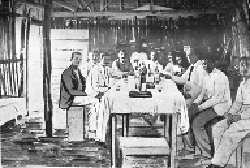Travel Reference
In-Depth Information
This is what transpired in the village of Curiujá on the third of July. The pillars of the community
offered a banquet to me and the Peruvian chief of mission. I accepted with pleasure; I was under the
illusion of a sympathy that would vanish shortly. I went to the commercial house of Carlos Scharff,
where the festivities were to be held, and which was managed by his bookkeeper, the German A.
Scharff. I was soon surprised by a profusion of Peruvian flags in contrast to a complete absence of
our own, in spite of the fact that it would have been easy for the host to acquire one at our camp.
Noting this fact, I thought to remove myself and waited for the first opportunity to do it without
fuss or scandal, when I observed that the greenery decorating the walls in the room where the festiv-
ities were to be held included those of paxiuba palm, which had leaves whose inside surfaces were of
an extremely intense yellow that contrasted with the green of the foliage. It was a solution.
Figure 17.3.
Dinner amongst the
caucheiros
, including the local king, Carlos Scharff. Da Cunha is
fourth from the left.
Really, a bit later, after being seated at the table I suddenly made a speech without waiting for an
opportune moment during the toasts, and in a rapid tribute I thanked them for the invitation, and this
for two essential reasons:
First, as an American, I felt happy at the display of cordiality between men who were of almost
brother races, and perhaps destined for intimate alliances in the future in response to the growing im-
perialism of the great nations.
Second, as a Brazilian, how profoundly moved I felt in light of the “inabsolute.” I clarified what I
meant by then telling them what an extraordinary nobility of feeling had impelled them when instead
ofseekingoutaBrazilianflagfromthemercenaryheartofsomecommercialfactory,theyhadinstead
searched in the soul of the forest, taking from it precisely the tree that most symbolized the superior
ideasofrectitudeandstature,andIendedwiththesewords:“Because,Peruviangentlemen,mycoun-
try is as righteous and as great as the palms.” . . . I couldn't express . . . the effect of these words, nor
the embarrassment with which the Peruvian chief and others complimented me, declaring that I had
“understood very well their thinking. . . .”
1
. . .
Westayedthereforafewdays,anintervalthatIusedtocarefullycalibratethechronometers.Itwas
the first time we'd really done it, because, in fact, the adjustments in Curanja had no value whatever,
due to the abnormal conditions in which they were carried out. I brought this to the attention of the
head of the Peruvian Commission: he had witnessed the unfavorable conditions in which I worked,
wherethedayswereingeneralquitecloudyandIhadinnumerableothertaskstoattendto.Theentire
situation was aggravated by the unfortunate circumstance of my assistant, Arnaldo de Cunha, having

Search WWH ::

Custom Search